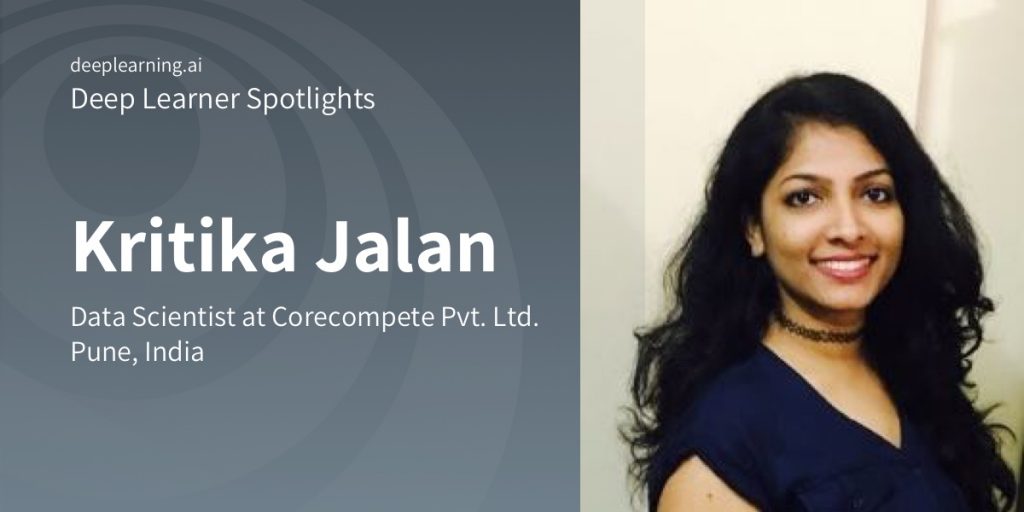Deep Learner Spotlight: Kritika Jalan

Introduce yourself: What’s your background? Did you have a technical role prior to enrolling in the course?
I am an IT engineer from Nirma University, India working currently as a data scientist in a US-based firm. Prior to enrolling in this course, I had some experience with data and analytics. After college, I worked at a couple consulting firms doing descriptive analytics for telco and pharma clients. During this time, I learned how to tell stories through data.
At my job, I learned how to analyze data to understand the past. Next, I wanted to see the future with data. So I started building my skills in predictive analytics. I was already 5 months into learning ML techniques and concepts when the DL specialization was released.
Why did you take the DL specialization?
There are several reasons why I took the DL specialization:
- For me, it’s easier to learn concepts through video lectures and sequences than articles and podcasts. Once I took the DL Specialization and understood the basic terminologies, I felt more confident. Also, I’ve always found the applications you learn in the course like image recognition, object detection, and music creation to be uber cool. Prof. Ng’s course was an opportunity for me to quickly understand complex topics in the world of mystical neural networks.
- Since it was Prof. Ng’s course, there was no skepticism around its quality, content and ease of understanding. The whole community was extremely excited about the course because the way he breaks down a difficult concept is unparalleled.
- The two companies I had worked with when the course came out were into data analytics. I had wanted to switch my role from Business Consultant to Data Scientist and saw the course as a stepping stone into the world of deep learning.
- I was part of a community that gathered twice a week to discuss ML topics, picked an ML challenge from online competitions, and started figuring out how to solve it together. Some of the senior data scientists in that group were really excited about this course, and that added to my motivation.
What was your level of familiarity with AI before taking this course?
I had a good understanding about techniques like Regression, Classification, Clustering etc., and I had heard briefly about neural networks and deep learning before taking the course. However, I had never read about deep learning or any concepts relating to it.
What did you find most valuable about the deep learning specialization?
The most valuable part of the specialization was Course 3 (Structuring Machine Learning Projects). Prof. Ng talks about a myriad of strategies to help improve your algorithm’s performance. I appreciate that this course imparts knowledge that isn’t readily available on the Internet and instead comes from experience. After completing that course, I felt so indebted that I wrote a 3-post series about it on Medium.
The whole specialization was like a one-stop-shop for me to decode neural networks and understand the math and logic behind every variation of it. I can say neural networks are less of a black box for a lot of us after taking the course.
Have you continued to learn about deep learning after completing the specialization?
Yes, I have. Since I am in the kind of role that requires working on deep models, I am always on the run to learn more and more. One major contributor in my learning has been the Kaggle community where we can participate in challenges, build our models and ask the community for feedback and ways to improve them. Apart from that, at any point in time, I am enrolled in one or the other MOOCs just to gather knowledge from wherever I can.
What are you currently working on? How did the DL specialization help you get there?
The specialization was instrumental in helping me enter my current role as a data scientist. I am currently working on building a NLP algorithm that can help our clients identify what components of their gadgets need improvement based on online customer reviews, seller feedback, and call center complaints. The techniques I learned in Course 5 (Sequence Models) have been particularly useful for tackling this project.
Anything else you’d like to share?
Here’s a quote capturing the essence of Course 3:
“It is our choices, Harry, that show what we truly are, far more than our abilities.”
– Prof Dumbledore
“It is the errors, Harry, that show us what our model truly is, far more than the accuracy.”
– Prof. Ng